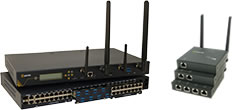
Colocation providers extend helping hand
By Max BurkhalterMay 11, 2012
If there was ever a time for data center managers to kick back and relax, this isn't it. With business executives taking a keener interest in what's going on behind IT department walls these days, and the relentless march of big data knocking on the door as well, tensions are high and the margin for error is low.
But while fighting all of these developments head on shows courage, it may also demonstrate a lack of foresight. With the pace of innovation showing no signs of slowing down, companies are questioning the sustainability of their current plans and starting to get creative. One approach that may help stem the tide is partnering with a colocation provider.
According to Network Computing editor Mike Fratto, colleague Kurt Marko recently turned some heads at a panel discussion on data center sustainability at the Interop conference in Las Vegas. While his neighboring speakers were focused on helping overtaxed IT managers prepare for the year ahead, Marko turned the conversation on its ear by suggesting that few companies will realistically be able to provide the level of performance offered by a colocation provider. From power and cooling to networking and fault tolerance, data center managers would be hard pressed to compete with the specialized data center outsourcing experts.
What Marko left out, according to Fratto, was the fact that colocation facilities are exponentially more scalable as well. In these uncertain, boom and bust economic times, the ability to expand and contract at a moment's notice is much more than convenient - it's imperative. And with facilities currently being built at a pace well ahead of demand, now may be the best time for companies to lock in an affordable plot of server space before a flood of followers drive up prices in the next few years.
"I was talking about co-lo 20 years ago or more. At the time, I don't think the remote management components were as sophisticated as they are today, which made on-site visits more likely," Fratto wrote. "But with the ability to manage servers from the hardware using BIOS functions like ILO and DRAC on up to the OS remote desktop, there's little need to actually touch the hardware once it's racked, cabled and powered on."
The one caveat to this strategy, according to ZDNet's David Chernicoff, is the fact that the virtualization technologies that support remote data center management evolve fairly rapidly. As a result, companies must know where to pick their spots and apply the right solutions to the right problems. Having a "generic" virtualization strategy with no real customization and optimization would be like leaving money on the table.
Perle’s wide range of 1 to 48 port Perle Console Servers provide data center managers and network administrators with secure remote management of any device with a serial console port. Plus, they are the only truly fault tolerant Console Servers on the market with the advanced security functionality needed to easily perform secure remote data center management and out-of-band management of IT assets from anywhere in the world.



